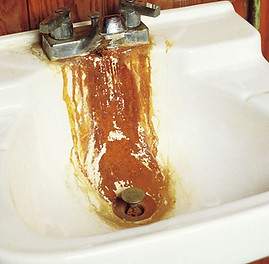OFFERING FREE WATER TESTS AND NO-OBLIGATION QUOTES
WHAT'S IN YOUR WATER?
Your water affects more than just your health; water quality can affect the life expectancy of major appliances such as dishwashers and hot water heaters. It's important to protect your investments in addition to your health and we can help.
City Water
Hardness
Typically noticed as white crusty buildup on faucets, hard water caused by calcium dissolved in the water leads to wear and tear on plumbing, appliances and hot water heater elements. Hard water also causes dry skin and hair and makes soaps & detergents less reactive.


Chlorine
Municipal water is treated heavily with chlorine to ensure that no bacteria or viruses are present in any household water. Though chlorine is not dangerous to drink at the levels in municipal water, the chlorine contributes to dry skin & hair and creates an unfavorable flavor in the water.

Dissolved Solids
Minerals, salts, metals, and cations/anions dissolve into the water from natural sources and can also be incorporated in water supplies due to urban-runoff, sewage, and industrial wastewater. Additionally, the chemicals used in the water treatment process add more dissolved solids. These contribute to the hardness and can leave spots on clean dishes or create a bad taste to the water.
Well Water
In addition to Hardness and Dissolved Solids, well water comes with additional potential contaminants:
Sulfur
Noticeable as a strong rotten-egg smell, Sulfur is most often present as Hydrogen Sulfide gas. Decomposing plant material, sulfur reducing bacteria, and natural mineral deposits contribute to the increased levels of Hydrogen Sulfide in the water. Sulfate mineral also dissolves in the water from natural deposits and creates the same smell. In lower quantities, Sulfur is not harmful, however in rare cases of extremely high levels it can be poisonous or flammable.


Iron & Manganese
Present in either dissolved or suspended states, Iron is notable as a brown staining that collects in the plumbing. The iron builds up in pipes and can restrict the flow of water and collects in toilets & sinks leaving behind rust-colored stains. It is not unsafe to drink the iron, though it may be undesirable as it adds a metallic taste and smell to the water. Some bacteria feed on iron as well and will live in toilet tanks, though this is less common and requires specialized treatment.
Manganese is typically a black sediment which collects similarly to Iron and is removed using similar treatment.
Sediment
Small grit, clay, dirt, and rocks can filter into the water table and into the well from surface-runoff. Shallow wells are more susceptible to sediment issues. Sediment builds up in faucet screens and restricts flow throughout the home. Though typically harmless, sediment causes water to be brown and unappealingly muddy.


Acidic Water
Blue-Green staining and pinholes in pipe are caused by acidic water corroding copper piping. Acidic water can wear down rubber fittings and in very acidic conditions can lead to acidosis.
Bacteria
E-Coli and Coliform bacteria can cause serious illness. Typically, these kinds of bacteria get into the well from surface run-off and are present in fecal matter of humans and animals. Homes located nearby livestock farms and waste disposal sites are more susceptible to bacteria infection. Diarrhea and stomach-ache are the common symptoms associated with bacteria consumption. Laboratory testing is highly recommended if bacteria is suspected.


Nitrates/Nitrites
Nitrates are typically introduced to the water table from the decomposition of plant matter and animal wastes. Fertilizers are a major contributor to excessive Nitrate levels. In small quantities, Nitrates are harmless; in excess, Nitrates can cause serious complications for infants leading to "blue baby syndrome". Laboratory testing is recommended if Nitrates are suspected.

Heavy Metals
Some metals like Lead, Chromium, Arsenic, and Mercury, to name a few, can leech into ground water from agricultural, industrial, or domestic sources. While, in low doses, these metals are not harmful, if present in high quantities, these metals can pose health risks. Laboratory testing is required to isolate these components if they are suspected to be present. Those who live in close proximity to mines or industrial plants are more susceptible.
Call Today!
Find out what kind of water quality you have with a free in-home analysis.
(toll free)



